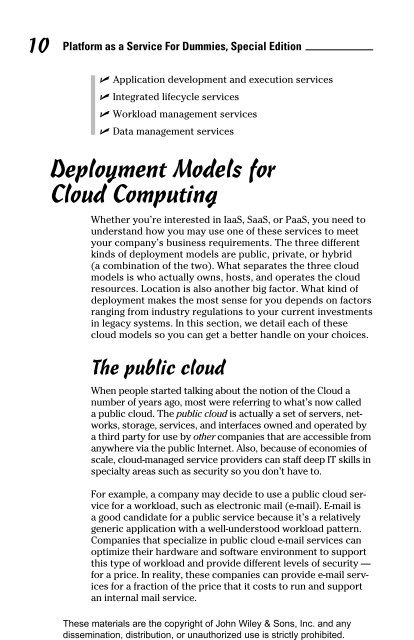u3Zgz
u3Zgz
u3Zgz
You also want an ePaper? Increase the reach of your titles
YUMPU automatically turns print PDFs into web optimized ePapers that Google loves.
These materials are the copyright of John Wiley & Sons, Inc. and any<br />
dissemination, distribution, or unauthorized use is strictly prohibited.<br />
10<br />
Platform as a Service For Dummies, Special Edition<br />
✓ Application development and execution services<br />
✓ Integrated lifecycle services<br />
✓ Workload management services<br />
✓ Data management services<br />
Deployment Models for<br />
Cloud Computing<br />
Whether you’re interested in IaaS, SaaS, or PaaS, you need to<br />
understand how you may use one of these services to meet<br />
your company’s business requirements. The three different<br />
kinds of deployment models are public, private, or hybrid<br />
(a combination of the two). What separates the three cloud<br />
models is who actually owns, hosts, and operates the cloud<br />
resources. Location is also another big factor. What kind of<br />
deployment makes the most sense for you depends on factors<br />
ranging from industry regulations to your current investments<br />
in legacy systems. In this section, we detail each of these<br />
cloud models so you can get a better handle on your choices.<br />
The public cloud<br />
When people started talking about the notion of the Cloud a<br />
number of years ago, most were referring to what’s now called<br />
a public cloud. The public cloud is actually a set of servers, networks,<br />
storage, services, and interfaces owned and operated by<br />
a third party for use by other companies that are accessible from<br />
anywhere via the public Internet. Also, because of economies of<br />
scale, cloud-managed service providers can staff deep IT skills in<br />
specialty areas such as security so you don’t have to.<br />
For example, a company may decide to use a public cloud service<br />
for a workload, such as electronic mail (e-mail). E-mail is<br />
a good candidate for a public service because it’s a relatively<br />
generic application with a well-understood workload pattern.<br />
Companies that specialize in public cloud e-mail services can<br />
optimize their hardware and software environment to support<br />
this type of workload and provide different levels of security —<br />
for a price. In reality, these companies can provide e-mail services<br />
for a fraction of the price that it costs to run and support<br />
an internal mail service.


